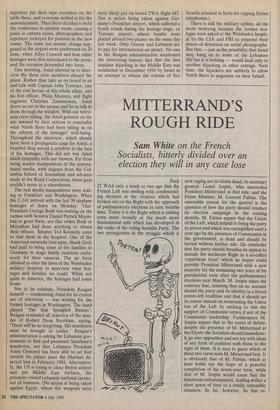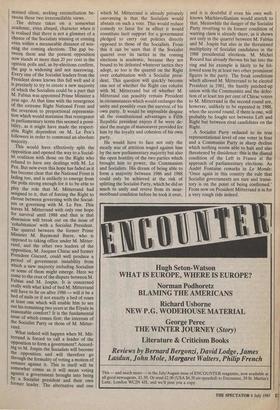MITTERRAND'S ROUGH RIDE
Sam White on the French
Socialists, bitterly divided over an election they will in any case lose
Paris IT WAS only a week or two ago that the French Left was smiling with condescend- ing derision at the rivalries which had broken out on the Right with the approach of parliamentary elections in nine months time. Today it is the Right which is smiling even more broadly at the much more fundamental split which has developed in the ranks of the ruling Socialist Party. The two protagonists in the struggle which is now raging are its titular head, its secretary general Lionel Jospin, who succeeded President Mitterrand in that role, and the Prime Minister, M. Laurent Fabius. The ostensible reason for the quarrel is the question of how the party should conduct its election campaign in the coming months. M. Fabius argues that the Union of the Left, which helped to bring the party to power and which was exemplified until a year ago by the presence of Communists in the government, is dead and should be buried without further ado. He concludes that the party should broaden its appeal to include the moderate Right in a so-called 'republican front' which he hopes could provide President Mitterrand with a new majority for the remaining two years of his presidential term after the parliamentary elections next March. M. Jospin takes the contrary line, insisting that on no account should the party sink its identity in a broad centre-left coalition and that it should set its course instead on resurrecting the Union ion of the Left by seeking to win the support of Communist voters if not of the Communist leadership. Furthermore M. Jospin argues that in the event of defeat, despite the presence of M. Mitterrand at the Elyse& the Socialists should immediate- ly go into opposition and not toy with ideas of any form of coalition with those to the right of them. It is easy to guess which of these two views suits M. Mitterrand best. It is obviously that of M. Fabius, which at least holds out the hope of a peaceful completion of his seven-year term, while that of M. Jospin would cause him the maximum embarrassment, leading within a short space of time to a totally untenable situation. So far, however, he has re- mained silent, seeking reconciliation be- tween these two irreconcilable views.
The debate takes on a somewhat academic, even absurd, character when it is realised that there is not a glimmer of a chance of the Socialists winning or coming even within a measurable distance of win- ning the coming elections. The gap be- tween them and the present opposition now stands at more than 20 per cent in the Opinion polls and, as by-elections confirm, the gap is widening and not narrowing. Every one of the Socialist leaders from the President down knows this full well and it is precisely to try to create a new majority of which the Socialists could be a part that M. Fabius was appointed Prime Minister a year ago. At that time with the resurgence of the extreme Right National Front and the reversion to proportional representa- tion which would maximise that resurgence in parliamentary terms this seemed a possi- bility, as it might have made the respect- able Right dependent on M. Le Pen's followers in order to command an absolute majority.
This would have effectively split the Opposition and opened the way to a Social- ist coalition with those on the Right who refused to have any dealings with M. Le Pen. But now even this hope has faded as it has become clear that the National Front is fading too, and is unlikely to emerge from the polls strong enough for it to be able to play the role that M. Mitterrand had assigned to it, that of forcing the Right to choose between governing with the Social- ists or governing with M. Le Pen. This leaves M. Mitterrand with only one hope for survival until 1988 and that is that dissension will break out on the issue of 'cohabitation' with a Socialist President. The quarrel between the former Prime Minister M. Raymond Bane, who is Opposed to taking office under M. Mitter- rand, and the other two leaders of the Opposition, M. Jacques Chirac and former President Giscard, could well produce a period of government instability from which a new majority including Socialists or some of them might emerge. Here we come to the crux of the dispute between M. Fabius and M. Jospin. It is concerned really with what kind of bed M. Mitterrand will have to lie on after 1986 — will it be a bed of nails or if not exactly a bed of roses at least one which will enable him to see out his remaining two years at the Elysee in reasonable comfort? It is the fundamental issue of which comes first: the interests of the Socialist Party or those of M. Mitter- rand.
What indeed will happen when M. Mit- terrand is forced to call a leader of the Fopposition to form a government? Accord- ing to M. Jospin the Socialists will become the opposition and will therefore go through the formality of voting a motion of censure against it. This in itself will be somewhat comic as it will mean voting against a government brought into being by a Socialist president and their own former leader. The alternative and one which M. Mitterrand is already privately canvassing is that the Socialists would abstain on such a vote. This would reduce comedy to farce for in effect it would constitute tacit support for a government pledged to carry out policies directly opposed to those of the Socialists. From this it can be seen that if the Socialist quarrel over its tactics in the coming elections is academic, because they are bound to be defeated whatever tactics they adopt, so too is the quarrel on the Right over cohabitation with a Socialist presi- dent. This question will quickly become one not of whether the Right can cohabit with M. Mitterrand but of whether M. Mitterand can possibly remain President in circumstances which would endanger the unity and possibly even the survival of his own party. It would be impossible despite all the constitutional advantages a Fifth Republic president enjoys if he were de- nied the margin of manoeuvre provided for him by the loyalty and cohesion of his own party. He would have to face not only the steady war of attrition waged against him by the new parliamentary majority but also the open hostility of the two parties which brought him to power, the Communists and Socialists. His dream of being able to form a majority between 1986 and 1988 could only be achieved at the risk of splitting the Socialist Party, which he did so much to unify and revive from its near- moribund condition before he took it over, and it is doubtful if even his own well- known Machiavellianism would stretch to that. Meanwhile the danger of the Socialist Party reverting to its former condition of warring clans is already there, as is shown not only in the quarrel between M. Fabius and M. Jospin but also in the threatened multiplicity of Socialist candidates in the 1988 presidential elections. M. Michel Rocard has already thrown his hat into the ring and his example is likely to be fol- lowed soon by at least two other prominent figures in the party. The freak conditions which allowed M. Mitterrand to be elected President in 1981, the hastily patched-up union with the Communists and the defec- tion of at least ten per cent of Chirac voters to M. Mitterrand in the second round are, however, unlikely to be repeated in 1988, when the second round, if there is one, will probably be fought not between Left and Right but between rival candidates on the Right.
A Socialist Party reduced to its true representational level of one voter in four and a Communist Party in sharp decline which nothing seems able to halt and also threatened by dissidence: this is the dismal condition of the Left in France at the approach of parliamentary elections. As Andre Fontaine remarks in Le Monde: 'Once again in this country the rule that Socialist governments are rare and transi- tory is on the .point of being confirmed.' From now on President Mitterrand is in for a very rough ride indeed.



















































 Previous page
Previous page